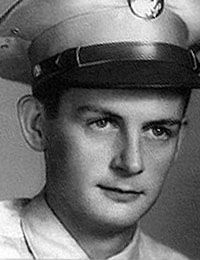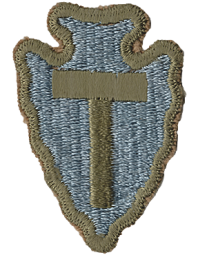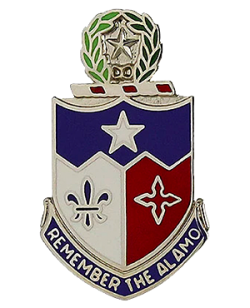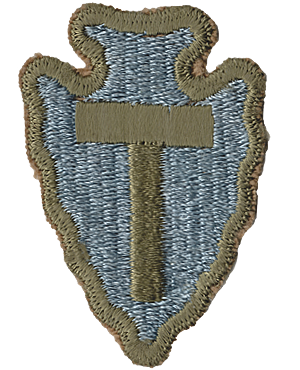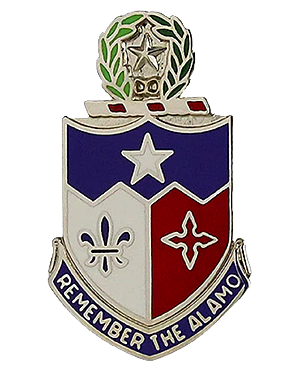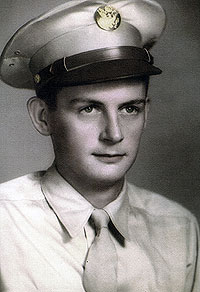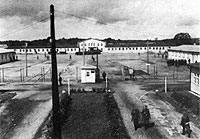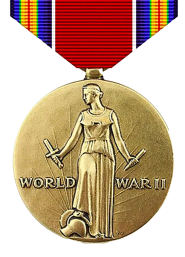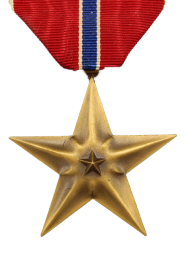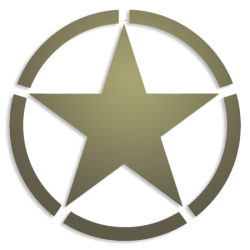My brothers and I were all drafted into the United States Army. The oldest, Fredrick, was in the first draft lottery drawn personally by President Franklin D. Roosevelt in 1940. The next year, Fred went on the first troop ship to England, the Queen Mary. George’s draft number followed and he was called to service in 1944. He left a wife and a 3-year-old baby at home.
I was not yet married when I was called into service. (Joyce and I met after the war. We married on October 20, 1946.) I was 19-years-old when I was drafted into the army infantry. Most of us were about 18 or 19 years old and had never been away from home before.
I went overseas on the Empress of Scotland in September of ’43. The ship off loaded us in Casablanca, Morocco on the continent of Africa. We trained there for a few weeks before being transferred in boxcars to Oran, Algeria. After a few more weeks of further training, we were shipped off to Naples, Italy. Traveling via boxcar we went to the deserted Count Ciano’s Dairy Farm, previously owned by Mussolini’s nephew, and then onward to meet up with the 36th Division of the 5th Army. We slept in eight-man tents.
I was assigned to the 141st Regiment, 2nd Battalion, Company G, 3rd Platoon, Mortar Section as an ammunitions carrier. I became a “yardbird” and a “dog-face.” A Yardbird meaning the bottom rung of the ladder. The term dog-faces referred to infantrymen serving in Italy who were coming off the line. (One newsman had said that they looked like dog-faces because they were so tired and expressionless. The name stuck and became a proud symbol of what kind of men we were.)
At that time our Front was on Mount Rotondo where pack mules delivered supplies and carried away our dead. One supply we received daily was a pack of cigarettes i.e., Lucky Strikes, Camels. (Many of the servicemen didn’t smoke prior to the war. By the end of their service, smoking became a lifetime habit.) A black wire designated the pathway for travel to us during the dark hours.
Of the battles themselves, I don’t want to write. They were horrific! One day was lifetime.
We spent time at the battle of the Rapido River. We had made a river crossing. Right after everyone got across the Germans shelled the bridge. That meant there was no going back. Out of food and ammo, that night our officers surrendered. Very few of our guards spoke English. The day I was captured, I lost a great deal; my best-friend in the Army was killed next to me in the drainage ditch we were using as a foxhole. (Foxholes were dug if time permitted; however, even then one could only dig approximately two feet before water filled the hole. Stone mini-fortresses were built in the mountainous area where digging through the stony ground was impossible. The stones would tumble down when assaulted.)
On that day, Jan. 22, 1944, I also lost my freedom. Captured by the Germans, I was sent to Germany in a“40 & 8” boxcar. (Boxcars were referred to as 40 & 8 as description of being able to hold 40 men or 8 horses.) Approximately 50 men were crammed into our boxcar. We were unable to all sit down at the same time; we rotated positions. Our train stopped only twice in 5 days; once in Austria and once during a bombing raid in Berlin. We had no sanitary facilities and no food. Many men became ill with dysentery. The stench was unbearable; yet, we survived.
Six days later we arrived at Stalag 4b. Ordered to strip off our clothes, we were given delousing showers while our clothes were similarly treated. I managed to get my own clothes back after spending 5 hours in the cold. We were given a little turnip soup at that time. It was terrible, but it was hot.
Three weeks later another boxcar trip took us to Stalag 2b in what is now Poland. I stayed there two weeks until I was sent with 38 other men to work on a large potato farm.
On the farm we were guarded by German soldiers. (Thank God it was not the Waffen SS!) Fortunately, we were secretly informed as to who the Gestapo members were in the town. We got along quite well with our guards at the farm. Every now and then we had a problem with one but our leader/arbitrator usually got it straightened out with no bloodshed. As far as informants…there were some at the main Stalag; however, none on the farm. We worked with the German civilians in the fields. They were not too friendly at first, but after a time they came to realize we were not the gangsters the propaganda had portrayed us as. The civilians were mostly old people; all the young men had been drafted into the army. Most were peasants and had never been out of their village. A few of them spoke English. The town was very small, perhaps 15 houses and a small church. (The church was only opened for weddings and funerals. I saw it open only twice; once for a wedding and once a funeral. I often wonder if the Church could have made a difference.) Prior to the arrival of us U.S. POWs, French and Russian soldiers had been interned in this village. We were never afforded the opportunity to associate with the other captives. We did note, however, that they were granted more leniency than we experienced.
Living conditions were terrible. All of us 39 men lived in one-half of a small barn. An outhouse was located nearby; however, we locked in the barn at night. During the fall and winter months, it became dark outside as early as 3:30 in the afternoon. We slept in wooden-slat bunks with straw mattresses. Since the barn had previously stored grain, varmints were present. Often field mice would sneak under our covers and crawl over our legs. We had no way of taking showers or washing our one set of clothes; we soon smelled pretty bad. I guess we did not realize how bad we smelled because we smelled just as bad as the next guy. Imagine, one set of clothes for 18 months. The toes of my socks eventually wore completely out to halfway up my foot. We did get to shave on occasion; we splashed water on our faces. One time we were given the blessing of a swim in a local pond.
We had very little food. Getting enough food was our main concern. We were given barley soup with milk for breakfast. We stole potatoes on a daily basis. The Germans knew we were taking the potatoes. Evidently it was a quiet agreement; actually “stealing” was considered to be a serious offense. We all became weak from lack of food or nutritional quality. I decided that after the war I would never go hungry again…conversations always seemed to turned to food.
We did whatever farm work was required of us. “Wood’s Detail” cutting wood, was a favored job. The guard treated us as if we were his own children. We cultivated and planted potatoes, barley, and turnips. Occasionally, we were required to dig the drainage/irrigation ditches. Two of our men worked in the carpenter’s shop making parts for the wagons. The worst work detail was the shoveling and spreading of manure. The two men in our group who wore glasses spent 95% of their time in the manure pile. (This work detail assignment came as a result of their imperfection; the need to wear glasses.) We were “paid” once a month for our work. The pay was in the form of 5 cigarettes, 5 razor blades, a box of matches, and a rationing of marmalade.
In addition to the physical exercise gained from working, our group actively worked to keep our minds sharp. We didn’t have any books to read, no playing cards. The evenings were long and boring. Everyone seemed to be lost in his own thoughts. I know I thought mostly of home and what my parents were doing. We created games; silly contests challenged our spirits. During Wood’s Detail, the favorite game was “Break the Wind”. (Being without established game props such as playing cards and game boards, we had to use the environment in which we lived; therefore, even bodily functions such as farting became worthy of a challenge.) The “Last Look” game, in retrospect, speaks a great deal about the true danger we always knew existed. To win this game, you merely had to be the last one to sit up and look at the guys in the group. A Last Look….One of our guys, we called him “Little Joe”, had a wonderful comic sense. His interpretations of Hitler giving a speech brought us with laughter through many hours. (Joe combed his hair forward over his head and face until the hair reached his upper lip, thereby creating his unique Hitler look.) We tried to make alcohol from potatoes; however, it was still fermenting when they evacuated us. It didn’t matter to me because I didn’t drink anyway.
About escape plans…When we arrived on the farm, a German Colonel told us that we could escape at any time; however, for each one who escaped, two would be shot. Could we put our buddies’ lives in jeopardy to save our own skins? I don’t think so. The 39 men who were with me were the greatest group of men I have ever had the honor of serving with. I love them like brothers. Our whole survival was the strong helping the weak. We were a diverse ethnic and religious group yet, everybody was treated the same; share and share alike. There was never a fight amongst us.
I was carried as missing in action until May 1944 when the government notified my parents that I was a POW. We were allowed to write one letter a month. The next month we were allowed one postcard. They alternated this way every month. All our mail was closely censored. We could tell our parents that we were working on a farm and feeling good. Needless to say, we would not tell them we were hurt. My parents had enough to worry about. My two brothers were in combat, one in the Infantry and the other as a combat medic. While I was a POW, I received a letter from George’s wife telling me he had he had been drafted. My mother had three of the blue stars hanging in the window. (The gold star banner meant killed in action and the blue star meant that person was in the service.) My family eventually received most of my mail. A significant portion of their mail to me was returned to them. I hadn’t received any mail since I had left the States, from Nov. 1943 until July of 1944. I received only one parcel in all the time I was there. It contained mostly canned food that would not spoil.
In review, I am certain that my overall treatment and chances for survival were greater with my placement on the farm instead of in a Stalag. The daily physical exertion, although difficult in our weakened state, served as stimulus for both our bodies and minds. Our separation and containment meant reduced risk of communicable disease. Unfortunately, being isolated also meant that we had little opportunity to hear correct or encouraging news of the war. We did hear some news from a friendly German farmer who listened illegally to BBC from London. (One day, I realized that he had not been in the fields for several days. I questioned one of the other farmers. He told me that the man had been listening to the BBC late one night. When his daughter woke and discovered her father’s betrayal, she had turned him in to the Gestapo.)
How we survived…. As a POW you learn to accept things as they come. We realized we were at the mercy of our captors every day. Whatever they decided to do; we had no control over it. We just lived from day to day. I had a good buddy who was from Alabama. We shared everything. He was quite feisty, so I often had to keep him from getting in trouble with the Germans. We had become good friends while serving together in the same squad in the 36th Division. (Sadly, I lost track of him and had tried to find him for 15 years. He could have died by now. He would be 76 years old.)
The hardest thing to accept was not being able to speak to your parents and assure them that you are okay. And, letters don’t do it. I did not know if they had been notified of my capture. As far as thinking about home…most of the time I tried to figure out what my folks would be doing at that time. I also had my brothers to worry about. At the same time my own life was quite precarious from day to day. It could do quite a job on a man’s mind.
We hoped and prayed that every day went well. (A wise man once said, and I quote, “There is no such thing as an atheist in a fox hole.” I agree with him.) We all feel that some one was watching over us. The guard that was so good to us was a Lutheran. One day, out in the forest miles from nowhere, he saw my bible. He looked around carefully and pulled his own bible out of his coat. He said, “I also believe.” We came so close to being killed so many times…someone must have been watching over us. It was so difficult not knowing when it would end. We survived because of our faith in God and in our country.
As for the invasion we heard nothing about it until it happened. A German civilian told us about it. We said the war was over for him. He scoffed at that. He said Hitler had a plan to let the Allies come in at first then to surround and annihilate them. (Talk about never say die.) We thought that we might get to go home soon. Too much hope; it took 12 months more. And, the worst was yet to come.
As the Allies pushed forward on both European fronts, the news impacted more heavily on the village, eventually causing a complete evacuation. On Jan. 29th 1945, we had to leave the farm because the Russian troops were very near. We were leery of the Russians. We had heard rumors of things they had done to the Germans during the advance. And, we assumed they had never seen American uniforms; therefore, we could be mistaken for Germans. The German civilians left on the march the same night we did. (After the war, they could not return to their homes, since the land was reestablished to Poland.) The night we left our farm in Poland was a cold snowy night. We were all weak, suffering from malnutrition. After trudging through the snow for a few hours 3 or 4 men fell out and said they were quitting. Three of the bigger men carried their belongings all night. The next day they were able to continue and made it with a little help.
Our “Death March” ended on March 10th in Hamburg, Germany, after a distance of 470 miles. It was the coldest winter on record in Europe. Below zero most of the time. The combination of cold and hunger took its toll. Some people didn’t make it. For supplies we had the clothes on our backs and some German bread we had been able to steal. Things were quite chaotic with the German civilians leaving with us. They had all their belongings tied to a horse and wagon. One cow tied behind for milk. I would think they soon ate them. Afterwards I learned that 20 million people were on the road at that time.
One day I saw what looked like an old folk’s nursing home, but outside there were all young girls. I asked the guard what it was. He called it a baby factory. These pregnant girls had been impregnated by German soldiers and received royal treatment. If the babies were boys, they were taken and cared for by the German government. No one seemed to know what happened to baby girls.
At the end of our march, our group was separated. As tough as the entire experience was, we now lost the companionship of our “brothers”. I was sent to a sawmill to work. Same conditions…very little food and no sanitary facilities to speak of. We were strafed and bombed everyday by our own air force. (They had no way of knowing we were there. How ironic if after all this we had been killed by our own airforce.) Our guards finally allowed us to paint “U.S. POWs” on the roof of our barn. One pilot came down low and waved to us to let us know, they knew we were there. After that they stayed away from our quarters.
Our German guards left the sawmill one-week before the Allies arrived. On May 8th, we were finally liberated. We headed home to the greatest country in the world, bar none! Thirty-eight of us (1 had developed mental difficulties. We had to practically direct his every move, even reminding him to eat. No one had realized that his feet were turning black. Finally, he was taken away by the guards. We never heard anything more about him.)…38 had survived until our liberation. Three of our guys later committed suicide. Of the others…I’m uncertain how many could still be alive today. With every day we lose an estimated 1,500 U.S. WWII veterans!
As far as the Nuremberg Trials of the Germans…, it was designed to be fair and impartial. I believe it was. Goering…(I am not a violent person but I think I could have done him in myself.) Not one word of regret or apology. He seemed convinced that Hitler, in exterminating the Jews, was doing the right thing. And, nothing was said about the killing of the Gypsies or the Jehovah Witnesses. The Germans choose which rules of the Geneva Convention they abided by.
I received great treatment when I was released. I was rushed home very quickly, arriving on June 12, 1945. I had been given a 75 -day furlough. I was then sent to Fort Oglethorpe, Georgia for recuperation for 3 months. We got the best of food. And, we were allowed to come and go as we pleased. (I could not believe I was in the Army!) My brothers also made it home safely. Frederick, the medic, was in two invasions and had been awarded five campaign ribbons. He is one of the real heroes of the war. What a cross my mother and father had to bear! My father held up well but my mother was never the same, she had given away most of my personal belongings…perhaps a sign of her despair.
I still don’t regret the days I spent in Germany. I think it made a better man out of me. I think it taught me to have more compassion for others. People would ask about my experiences during the war. At first I would explain some of the events; however, the listener was always too shocked to believe that such horrifying evil was being committed. Even less believable was that someone like myself could survive through it. I recall one incident that deeply touched me. The man across the street from us had a son killed in the war. When I got home he hugged me and cried like a baby. I have always felt guilty about coming home when so many others died. That is foolish I know. Many of us feel that way. That doesn’t change anything.
In 1994 for the anniversary of D-Day, I went back to Poland. I contacted a Polish Priest in my hometown to get some help. He went back to Poland quite often. He had a brother who was in the Polish army. The day after we arrived in Poland, we found the town, Burzen, and the farm. The Germans had burned everything the night we left there. The town and some of the barns had been rebuilt. We found the ruins of our barn. There was nothing left. The church was beautifully remodeled. The town was just as rural as when we were there. The roads were still not paved. It was almost as though we had never left. The next day we went to the Stalag. It is now a Polish army camp and prison. We found hundreds of Russian graves at the Stalag. Locals told us that there was an American cemetery in the woods. We searched the woods all afternoon but could not find it. We also searched for a girl named “Stefania”, who had occasionally smuggled food to us. We learned that she had returned and lived in Burzen for six years after the war.
We have had annual Ex-POW reunions since 1981. What a great group of guys! This is the only time I can easily discuss what happened. I know they will understand. When I try to tell other people, they look at me as if to say, “That could not have happened!” The conversation usually ends there. We started with 10 men and are down to 4 now. Some can’t travel any more. Attending this reunion is the best part of my year! This is, I think, what kept me alive for 76 years.
Robert M. Abrahamson
